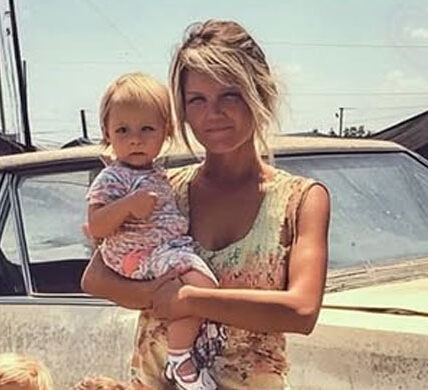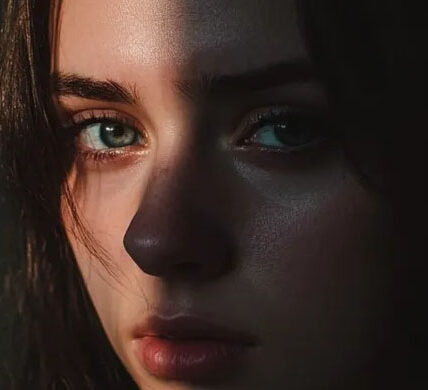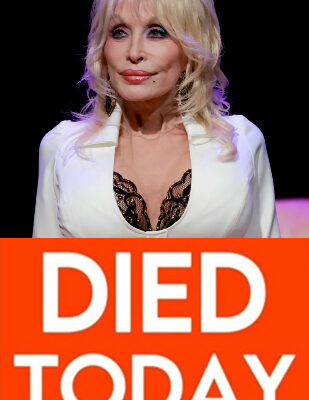A father and his young daughter were out for a drive when they spotted a group of majestic Clydesdale horses behind a fence. Drawn by curiosity, the little girl asked to get closer. At first shy, she soon gathered her courage and stood near one of the gentle giants as her father pulled out his phone for a picture. She smiled sweetly for the camera—only to discover later that the horse behind her had smiled too. Not just any smile, but a wide, toothy grin, perfectly timed for the shot. The father posted the photo online, and it quickly went viral, earning features in Time Magazine and BuzzFeed. For the family, though, it wasn’t about the attention—it was about a magical, unplanned moment of pure joy. Sometimes, the best memories happen when you least expect them… and in this case, when a horse decides to join in with a smile.
After the initial rush of attention, life went back to normal for the most part. The photo was still getting likes and shares here and there, but the family had no idea that the day they stopped to see those horses was only the beginning of a much bigger story. The little girl, whose name was Clara, had started keeping the photo in a small frame by her bed. Every night before sleep, she’d look at it and giggle, remembering how it felt to stand next to such a huge but gentle animal.
One Saturday morning, a letter arrived in the mail addressed to Clara’s father, Mark. It was from a horse rescue organization called Meadow Haven. They’d seen the photo online and thought it perfectly captured the bond that could exist between people and horses. In the letter, they invited Mark and Clara to visit their rescue farm and meet some of the horses they cared for. They even mentioned that one of their horses looked remarkably similar to the smiling Clydesdale in the photo.
Mark read the letter out loud at breakfast, and Clara’s eyes lit up. She couldn’t stop talking about it the whole day. The following weekend, they made the drive out to Meadow Haven, a sprawling property surrounded by rolling hills and white fences. As they pulled into the gravel driveway, Clara pressed her face against the car window, trying to see as much as she could.
The farm’s owner, a warm woman named Helen, greeted them with a big smile. She explained how the rescue worked—how they took in horses who had been neglected or abandoned, giving them medical care, food, and a safe home. Clara listened intently, her small hand gripping her father’s.
When Helen led them to the main paddock, Clara gasped. Standing near the fence was a tall, chestnut Clydesdale with a familiar white blaze down its face. Its eyes were calm and curious, and when Clara approached, it lowered its head toward her. Helen introduced him as Jasper. “He’s one of our friendliest,” she said. “And funny enough, he has a habit of making faces.”
Sure enough, when Mark raised his phone for a picture, Jasper curled his lips back in a toothy grin, just like the horse from that day on the roadside. Clara laughed so hard she had to hold her stomach. Helen chuckled and explained that Jasper had been with them for almost two years after being rescued from a farm that could no longer care for him. “He’s had a rough past,” she said softly. “But he’s got the sweetest heart.”
As the visit went on, Clara found herself drawn to Jasper again and again. She brushed his mane under Helen’s guidance, fed him carrot slices, and even learned how to gently lead him by his halter. By the end of the afternoon, Mark could see there was something forming between his daughter and this horse—a quiet, instant bond.
When they got home that evening, Clara was unusually quiet during dinner. Finally, she looked at her father and said, “Dad… do you think Jasper gets lonely?” Mark explained that the rescue made sure all the horses had friends and were well cared for, but he could tell Clara’s mind was already spinning with ideas.
Over the next few weeks, she started doing small chores around the house to earn “Jasper money.” She’d put the coins and bills in a jar with his name written on it in colorful letters. When Mark asked what the money was for, Clara said she wanted to sponsor Jasper at the rescue. Meadow Haven had a program where people could donate monthly to help care for a specific horse.
Mark called Helen to ask about it, and Helen was touched. “She’s one of the youngest sponsors we’ve ever had,” she said. From then on, every month, Clara would send a small envelope with her earnings to Meadow Haven, often with a drawing or note for Jasper tucked inside.
One day, months later, Helen called with surprising news. Jasper had been offered a permanent home with a loving family who had a large farm and other horses for him to be with. It was the kind of home every rescue dreamed of finding for their animals. But there was a catch—the family lived several states away, and if Jasper went, Clara wouldn’t be able to see him anymore.
When Mark told Clara, she didn’t say anything at first. That night, she sat on her bed, looking at the framed photo of the smiling horse. Finally, she said, “If it means he’ll be happy, I think he should go.” Her voice wavered a little, but she meant it. She asked if they could visit Jasper one last time before he left.
The next weekend, they drove back to Meadow Haven. Clara spent hours with Jasper, brushing him, feeding him treats, and talking to him like he could understand every word. When it was time to say goodbye, she wrapped her arms around his neck and whispered, “Thank you for smiling at me.”
On the way home, Mark told her how proud he was. “You’re giving him the best gift,” he said. “You’re letting him have the life he deserves.”
Months passed, and Clara kept sending letters to Meadow Haven, even though Jasper was gone. She got updates occasionally from his new owners, who said he was thriving—running in open pastures and making friends with their other horses.
Then, one spring afternoon, a large envelope arrived in the mail. Inside was a photo of Jasper in his new home, standing beside a foal. The letter explained that Jasper had become a sort of gentle uncle to the younger horses, looking after them and even playing with them. Clara grinned from ear to ear when she saw it.
But that wasn’t all. Tucked in the envelope was another letter—from Jasper’s new owners. They wrote that they’d been so moved by Clara’s kindness and maturity in letting Jasper go that they wanted to invite her and her father to visit the farm anytime. They even offered to teach Clara more about horse care and riding if she wanted to learn.
That summer, Mark and Clara made the trip. The farm was even more beautiful than they’d imagined—rolling fields, a big red barn, and horses grazing lazily in the sun. Jasper came trotting up the moment they entered the pasture, as if he remembered her. Clara laughed and hugged him, tears of joy in her eyes.
True to their word, Jasper’s new family began teaching Clara the basics of horseback riding. She started slowly, learning how to mount, hold the reins, and guide the horse gently. Each visit, she grew more confident, and Jasper seemed to enjoy having her ride him.
Over the next year, Clara’s visits became a regular thing. The bond between her and Jasper deepened, but so did her connection to the other horses on the farm. She learned to muck stalls, fill water troughs, and even help with feeding. She discovered that caring for horses wasn’t just about the fun moments—it was about showing up every day, rain or shine.
By the time Clara turned ten, she had decided she wanted to work with animals when she grew up. She told her father she was thinking about becoming a veterinarian or maybe running her own horse rescue someday. Mark smiled, remembering how it had all started with a random roadside stop and a grinning horse.
One crisp autumn day, during a visit to Jasper’s farm, the family surprised Clara with a gift. They led her to the barn, where a small, chestnut pony was waiting. “She’s yours to ride when you come here,” they told her. “We thought it was time you had a horse friend of your own to learn with.”
Clara was stunned. She named the pony Maple, and from that day on, she split her time between riding Jasper and caring for Maple. She learned not just about riding, but about patience, trust, and the quiet ways animals communicate.
Years later, when Clara was applying to colleges, she wrote her application essay about Jasper and the way a single unplanned moment had shaped her life. She was accepted into a veterinary science program, and her goal of helping animals became a reality.
Jasper grew older, his pace slowing, but he remained a constant presence in her life. Every time she visited, he would greet her with the same toothy grin that had started it all. And every time, she felt the same joy she’d felt as a little girl in that roadside photo.
The twist in the story wasn’t just that a random encounter led to a viral moment. It was that the smile of one horse had set off a chain of events that shaped the course of an entire life. Clara had found her passion, made lifelong friends, and learned what it meant to put another being’s happiness before her own.
The day Jasper passed peacefully in his pasture, Clara was there. She held his head in her lap, tears falling freely, but her heart full of gratitude. She knew he’d given her more than she could ever repay.
Now, as an adult working with animals every day, Clara often shares the story of the smiling horse with others. She tells them about how kindness, once given, has a way of finding its way back—sometimes in forms you could never predict.
Life has a funny way of giving us exactly what we need, even when it doesn’t look like it at first. That roadside stop was never planned, but it became the turning point for Clara’s entire journey. And it all started with a horse who decided to grin at the perfect moment.
If this story warmed your heart, share it with someone who could use a reminder that small moments can lead to big changes. And remember—joy often finds us when we’re not looking for it.


